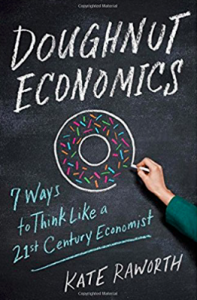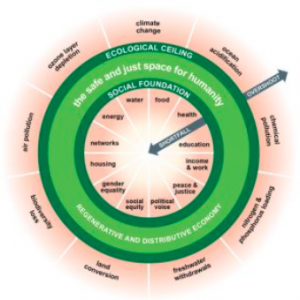Doughnut Economics, Kate Raworth
 Kate Raworth’s book Doughnut Economics offers us an alternative paradigm for economics, one that includes a social foundation of: food, health, education, health & work, peace & justice, political voice, social equity, gender equality, housing, networks, energy, and water. Further outlining ecological celling out economics: climate change, ocean acidification, chemical pollution, nitrogen & phosphorus loading, freshwater withdraws, land conservation, biodiversity loss, air pollution, and ozone layer depletion. Raworth’s webpage provides videos, podcasts, and even a blog to explore alternative ways to approach economics.
Kate Raworth’s book Doughnut Economics offers us an alternative paradigm for economics, one that includes a social foundation of: food, health, education, health & work, peace & justice, political voice, social equity, gender equality, housing, networks, energy, and water. Further outlining ecological celling out economics: climate change, ocean acidification, chemical pollution, nitrogen & phosphorus loading, freshwater withdraws, land conservation, biodiversity loss, air pollution, and ozone layer depletion. Raworth’s webpage provides videos, podcasts, and even a blog to explore alternative ways to approach economics.
Investigating our values may be a place to start. However, that is one piece to a larger change that needs to occur in order to bring our planet back to homeostasis.
- Redistribution of land ownership/ securing land ownership (p. 151)
- Time provisioning- St. Gallen, Swiss city. Every citizen over 60 can earn care-time credits by helping a local elderly resident (p.158)
- Blockchain– a digital peer-to-peer decentralised platform for tracking all kinds of value exchanged between people. It is enabling electricity microgrids to set up peer-to-peer trading in renewable energy. You can sell surplus or energy in a micogrid (p.159/162)
- Veritable ecosystem enterprises: innovative entrepreneurs and lawyers teaming up to write new kinds of corporate charter and company articles of association (p.161). Raworth says, we need to “invest in human ingenuity by teaching social entrepreneurship problem-solving and collaboration in schools and universities worldwide” (p.167)
- Robot dividend: Every person should have a stake in owning the robot technology itself. Millions of jobs will be lost to robots- “analysts predict that five million jobs across 15 major economies could be lost to automation by 2020.” Raworth suggests that since we invest in these technologies that we should also benefit from them financially (p.163-165). She says, “Given the extreme disruption to work, and hence incomes, that is anticipated by the rise of the robots, more such innovation proposals are needed to ensure that the wealth generated by their productively is widely distributed” (p.165)
- Distributive design: switch from taxing labour to taxing the use of non-renewable resources: “it would help to erode the unfair tax advantage currently given to firms investing in machines (a tax-deductible expense) rather than I human beings (a payroll expense) (p.164).
· Open source networks: Patents keep the rich, rich! Instead we need to be sharing our inventions/ technology and pathways to make and fix stuff! For example, Global Village Construction Set: Show you how to build from scratch 50 universally useful machines, from tractors, to 3D printers! (p. 166). Similarly, Open Building Institute aims to “make open-source designs for ecological, off grid affordable housing available to all.” (p.166)